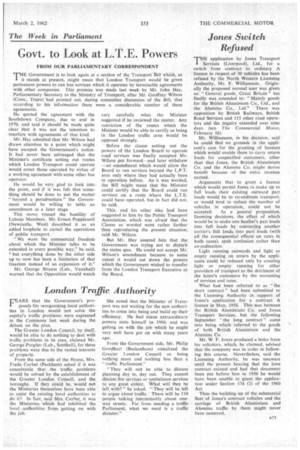Govt. to Look at L.T.E. Powers
Page 59

If you've noticed an error in this article please click here to report it so we can fix it.
FROM OUR PARLIAMENTARY CORRESPONDENT HE Government is to look again at a section of the Transport Bill which, as I. it stands at present, might mean that London Transport would be given permanent powers to run bus services which it operates by terminable agreements with other companies. This promise was made last week by Mr, John Hay, Parliamentary Secretary to the Ministry of Transport, after Mr. Geoffrey Wilson (Cons., Truro) had pointed out, during committee discussion of the Bill, that according to his information there were a considerable number of these agreements.
He quoted the agreement with the Southdown Company, clue to end in 1970, and said it should be made quite clear that it was not the intention to interfere with agreements of that kind.
Mr. Hay admitted that Mr. Wilson had drawn attention to a point which might have escaped the Government's notice. It had never been enVisaged that the Minister's certificate setting out routes which London Transport could operate would cover those operated by virtue of a working agreement with some other bus operator.
He would be very glad to look into the point, and if it was felt that something should be done to put the matter "beyond a peradventure" the Government would be willing to table an amendment at a later stage.
This move roused the hostility of Labour Members, Mr. Ernest Popplewell (Newcastle, West) described it as an added loophole to curtail the operations of public transport.
"We want the commercial freedom about which the Minister talks to be extended in every possible way," he said, "but everything done by the other side up to now has been a limitation of that freedom instead of an expansion of it."
Mr. George Strauss (Lab., Vauxhall) warned that the Oppositibn would watch very carefully what the Minister suggested if he reviewed the matter. Any restriction of the routes which the Minister would be able to certify as being in the London traffic area would be opposed strongly.
Before the clause setting out the powers of the London Board to operate road services was finally accepted Mr. Wilson put forward—and later withdrew —an amendment which would allow the Board to run services beyond the L.P.T. area only where they had actually been in operation before. As. it was worded, the Bill might mean that the Minister could certify that the Board could run services on a route where the L.T.E. could have operated, but in fact did not, he said.
This, and his other idea had been suggested to him by the Public Transport Association, which was afraid that the Clause as worded went rather farther than reproducing the present situation, said Mr. Wilson.
But Mr. Hay assured him that the Government was trying not to disturb the status quo. He could not accept Mr. Wilson's amendment because to some extent it would cut down the powers which the Government wished to transfer from the LondonTransport Executive to the Board,




















































































































































